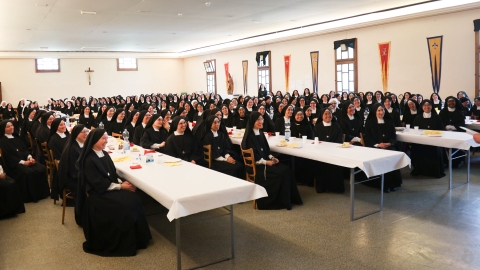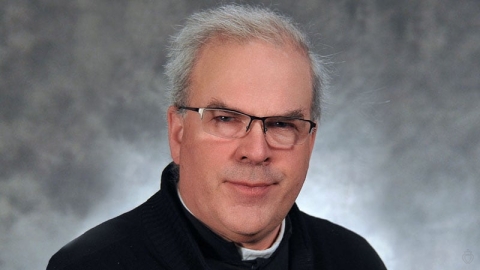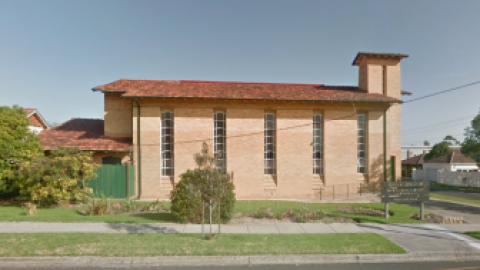The Act of Perfect Contrition

Sanctifying Grace + Death = Salvation. But, if we have lost Sanctifying Grace by sin, and cannot go to confession, how to we get back Sanctifying Grace and get back on the road to Salvation?
The forumla for heaven is very simple: Sanctifying Grace + Death = Salvation.
The difficulty is that these two addends in this sum, however are not in man’s control. A man could cause his own death, but not while retaining Sanctifying Grace. And Sanctifying Grace is a gift of God that man cannot merit to have, because it is the very principle of merit.
Adam and Eve were created with a human nature and a body which, by its nature, could decay and die, and a soul which was eternal. God decided to give Adam special gifts which exceeded human nature. The first was Sanctifying Grace, which made him pleasing in God’s sight, a friend of God, child of God and man’s soul totally confirmed and subject to God. Because man’s soul was subject to God, God fittingly made man’s body perfectly subject to his soul, and since the soul was immortal, so would the body be. Finally, because man was perfectly subject to God, creatures were to be totally subject to man, and so not only would they serve man, but nothing could hurt him.
As we know the devil tempted Eve through lies and seduced her (he made her to think something evil was actually good). Adam gave into the invitation of Eve to eat of the forbidden fruit, and in violating God’s law, they lost those privileges and gifts which they abused. They returned to the natural state, subjected to death, able to suffer and be harmed, and without Sanctifying Grace.
God would not give back immortality or impassibility (the inability to be harmed) in this life, saving those for the next life. He would, however give back to man Sanctifying Grace, first by Faith in the promised Redeemer, and then after the Redeemer had instituted Baptism, by this Sacrament. However, man, through his own fault could again, willingly throw away this grace. Recovering it required a perfect sorrow for his sins—the hatred of his sins because of the offense done towards God—or the perfection of his imperfect sorrow by the Sacrament of Penance.
The Sacrament of Penance
When a man commits a grave sin (also called mortal sin) this destroys Sanctifying Grace in his soul. A mortal sin is any sin which has serious or grave matter, the person both knows this, and giving his full attention to this fact, nevertheless decides to commit the sin anyway. He fully consents to this serious evil. God in His Mercy, wants all men to be saved, if these men will abandon their sins. God does not wish the death of sinners but that he convert and live (Ez. 18:23). Christ therfeore instituted a Sacrament to restore this lost grace: Penance.
This Sacrament is a tribunal in which the sinner acts as prosecutor accusing himself of his sins, makes no defense except to bring his sincere sorrow, is judged guilty by the priest acting on God’s behalf, who then pardons these sins. This sorrow must be for some supernatural motive, at least the fear of Hell and the loss of Heaven. Absolution perfects this imperfect motive. But this is not the only means by which a man can be restored to grace. St Thomas Aquinas1 is clear that God is not limited by His Sacraments. God could and does restore Sanctifying Grace to one who makes a Perfect Act of Contrition. God can give the same graces as received in Holy Communion through a Spiritual Communion.
The Perfect Act of Contrition
The Baltimore Catechism, explains that contrition "is sincere sorrow for having offended God, and hatred for the sins we have committed, with a firm purpose of sinning no more". Perfect contrition "is that which fills us with sorrow and hatred for sin, because it offends God, who is infinitely good in Himself and worthy of all love."
This latter Perfect Contrition is well testified to by the Church Fathers. St John Chrysostom wrote: “As a fire which has taken possession of a forest, cleans it out thoroughly, so the fire of love, wheresoever it falls, takes away and blots out everything that could injure the divine seed, and purges the earth for the reception of that seed. Where love is, there all evils are taken away.” The love that enkindles such contrition is the virtue of Charity.
The Council of Trent clearly teaches that no sin can be forgiven without confession, but Perfect Contrition, precisely, is never without confession. It must always include the real desire to confess these sins: “although it sometimes happen that this contrition is perfect through Charity, and reconciles man with God before this sacrament [of penance] be actually received,” decreed the Council, “reconciliation is not to be attributed to that contrition, independently of the desire of the sacrament.”
So Christ gives a very special grace to us if we have has the misfortune of falling into sin, to try before confession to escape, but making an act of Perfect Contrition, but this act must also include the intention of confessing these sins as soon as reasonably possible.
As much as it would be an error to think that God would forgive our sins without the desire to confess them as soon as possible, so too, it would be an error to think that Perfect Contrition is something that we can work ourselves up to, or is a matter of emotions. Perfect contrition is not a feeling, but a intellectual knowledge of our sins and their offence to God, along with a firm will to hate these sins because of this offence. Emotion and feelings are a great help towards this, but they are only helps.
Because it flows from Charity, which is God's own Love, infused by God into our souls, only God can give us the grace of making an act of Perfect Contrition. Therefore it is important that we pray often for this grace, and frequently, even before we may fall, to beg God to make us perfectly contrite for our sins. Were we so contrite all the time, we would never fall.
Making a Perfect Act of Contrition
While only God can infuse into us Charity, we can dispose ourselves on some level to prepare for this grace, and if we hope to have it, we must so dispose ourselves. Aside from praying often to have Perfect Contrition, it is important to bring to mind the seriousness of sin, and to meditate on the suffering sin has caused Jesus Christ.
Kneeling or prostrating oneself before a crucifix and questioning oneself about Who is on this Cross and why and what He has suffered can help dispose the soul to receive this grace, even if only God can give this.
Beyond disposing our emotions, and soul as we can, and praying for God to infuse this Charity and Contrition, it is critical that one recall the actual sins for which he is sorry. If sorrow is not grounded in reality—objective actions which have offended God— and rater is just an emotional grief, it is not real sorrow. It may even be worthwhile to “confess” our sins to God—though this is not necessary—and humble ourselves—which is necessary.
Then slowly, perhaps several times pray a suitable act. This might be in your own words, or using one of many standard forumlæ such as : “O my God, because you are so good, I am very sorry that I have sinned against you and by the help of your grace I will confess my sins and will not sin again.”
Or that of St Alphonsus : “I love you, Jesus, my love above all things, and I repent with my whole heart of having offended you. Never permit me to separate myself from you again, grant that I may love you always, and then do with me what you will.”
Or another, common in America : "O my God, I am heartily sorry for having offended Thee, and I detest all my sins because of Thy just punishments, but most of all because they offend Thee, my God, Who art all-good and deserving of all my love. I firmly resolve, with the help of Thy grace, to sin no more and to avoid the near occasions of sin."
The key elements here are to both mean and express our hatred of sin for having offended God who is all good, professing our perfect love of God, and promising with God grace to confess these sins, avoid the occasions of sin, and sin no more.
Finally, one must resolve to confess, and seek out confession as soon as possible, because without this resolution, there is no real contrition. This does not mean we need to rush off and wake the priest in the middle of the night, nor that we should wait for the next scheduled time for confession. We must confess reasonably soon, and really at the first opportunity. That might be at the next confession time, or perhaps we ought to call for an appointment with the priest. Since we can never be sure of our Perfect Contrition, since it is due only to the grace of God, we should be anxious to confess reasonably soon, lest we presume on God's Mercy, which itself can be a serious sin.
Perfect Contrition may save us from Hell, should we die, unable to confess, but it does not remove the need to confess.
Confession before Communion
As the Council of Trent points out, this desire to confess along with our sorrow is what obtains forgiveness. That desire must be fulfilled, if possible.
Fr J von Dreisch writes, “It is true that perfect contrition produces the same effects as confession, but it does not produce them independently of the sacrament of penance, since perfect contrition precisely supposes a firm purpose to confess the same sins that it has just pardoned.”
Thus, the Church Herself, demands that before receiving Communion, that we confess all mortal sins by name, and indentifying how many times or how frequently since the last good confession these have been committed before we can be readmitted to Communion. There is no way around this. To receive Communion without having our mortal sins forgiven in confession is a grave sin of Sacrilege and a supreme offense to God for desecrating the very Body of Christ, Who suffered to bring forgiveness to us.
Why is Perfect Contrition important?
Many reasons could be cited, but given that more and more people are without access to priests nearby every day, practically, this gift of God may save us from Hell, should we fall sick or die without a priest to bring us the Last Sacraments.
Practicing now, and living a life of Perfect Contrition is the best guarantee to die with it.





